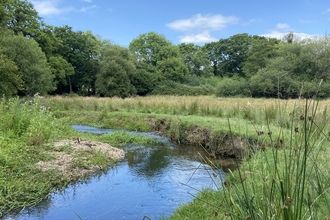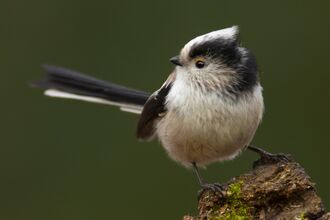Delphine Jones / River Hooke
Riverfly monitoring
Want to become a Riverfly Monitor
What are the aims of the riverfly monitoring project?
Part of the Riverfly Partnership and coordinated by Dorset Wildlife Trust, riverfly monitoring is designed to monitor and improve freshwater health across Dorset. This project helps to build up a picture of the health of the populations of freshwater invertebrates and reports on any significant changes to their presence or population sizes to in turn monitor and prevent pollution and water quality issues. The project aims to protect the water quality of our rivers, further the understanding of riverfly populations, and conserve riverfly habitats.
Volunteers are trained to complete ‘kick samples’ in the water to identify the presence of a range of aquatic invertebrate species. Many species of aquatic invertebrates are particularly sensitive to water quality issues and pollution, with their numbers acting as an early warning system for any potential problems. This valuable data ensures that water quality is checked more widely, and remedial action is taken at the earliest opportunity if any pollution or water quality issues are detected. These surveys detect and report serious pollution incidents, assess the health of our rivers and create long-term open use data sets.
This is an opportunity to become a citizen scientist and join a local team to see what’s living in Dorset’s rivers, learn to identify a variety of freshwater invertebrate species and help monitor river health and pollution.
Where is the project based?
This project covers the whole of Dorset. We currently have groups operating on various rivers, including the Frome, Char, Piddle, Asker and Stour. These groups always welcome more volunteers to help monitor their registered sites or to take on new ones in the area. We are keen to establish additional monitoring sites throughout the county, so please get in touch if you have a location in mind that could make a good riverfly monitoring site.
Who can be a riverfly monitor?
Anyone can be a riverfly monitor, but you will need to be able to get in and out of a river safely and to carry monitoring kit such as a net, bucket, sampling tray with you to your monitoring site. You will also need to be able to attend a day’s training session to learn to identify a variety of freshwater invertebrates.
Monitors start out on the eight-group survey, where identification focuses on eight main freshwater invertebrate groups. Volunteers who are interested may also progress onto extended riverfly, a 33-group survey with further identification training, once they have been monitoring for at least a year on the eight-group survey.
We ask all volunteers to carry out one-hour riverfly surveys once a month. These can be carried out all year round or throughout the spring /summer months, between April and September, depending on preference and river access.
Training for new volunteer monitors takes place in spring/early summer each year at dedicated training days with our experienced tutors.
If you would like to join this exciting and impactful volunteering opportunity, please get in touch here:
Once you get in touch, we will add you to our list of new monitors to be trained up at the next available sessions.





